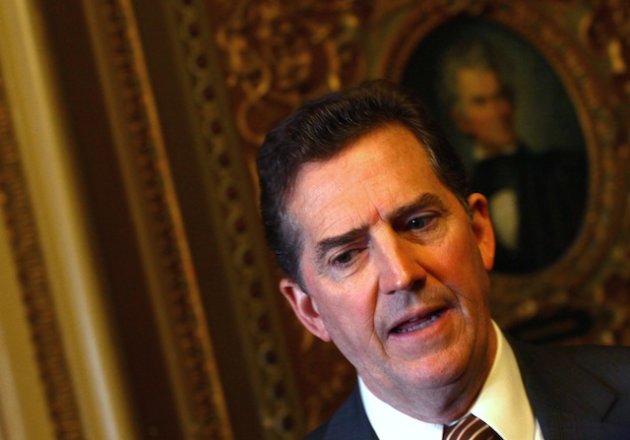 (Photo by Brandon Thibodeaux/Getty Images)
(Photo by Brandon Thibodeaux/Getty Images)
It's no surprise that Florida Sen. Marco Rubio took heat for an interview he gave to GQ magazine this month: Departing from scientific consensus, the rising Republican star refused to state whether the Earth is billions of years old or a few thousand, as many fundamentalist Christians believe.
What no one expected was the rebuke from televangelist and longtime Christian conservative leader Pat Robertson, dismissing theories of a "young Earth."
"If you fight science, you are going to lose your children," Robertson said last week during an appearance on the Christian Broadcast Network, the television empire he founded three decades ago.
Robertson wasn't directly speaking to Rubio, but the senator and others in his party might heed the advice. Viewed by many voters as anti-science and too conservative on social issues such as gay marriage, the Republican Party is in danger of losing young and less religious voters for years to come.
In a post-election breakdown by the Public Religion Research Institute, the Obama religious coalition mirrors the demographics of 18-29 year olds, whereas Romney's mirrors those of voters aged 65 and up.
On Nov. 6, as President Barack Obama won a narrow but clear victory over Mitt Romney, voters in four states expressed support for gay marriage. Anti-abortion candidates lost in several states, including Senate contenders Todd Akin of Missouri and Richard Mourdock of Indiana, both of whom stirred outrage from their remarks on rape.
Many experts believe these developments point in part to a decisive shift in the religious makeup of the country, one that could make or break a GOP comeback.
"The way Republicans speak is turning off the youngest, fastest growing groups in the country—Latinos and significantly, the unchurched, those with no religious affiliation," said Mark Rozell, a public policy professor at George Mason University who studies religion and politics. "To them, the Republicans are proselytizing."
Since the 1980s, organizations like Focus on the Family, the Moral Majority and the Christian Coalition cemented religious conservatives as visible and potent force in the Republican coalition and enforced discipline on social issues such as abortion and gay rights. But now, the religious landscape is changing beneath their feet.
Studies suggest the number of unchurched has doubled in the past two decades and shot up by 25 percent in the last four years. The shift has taken place across the country and across economic classes, most notably among the young; one fifth of adults and one third of Americans under thirty now declare themselves religiously unaffiliated.
The new and expanding group of unchurched voters overwhelmingly support same sex-marriage and legal abortion, and so they gravitate toward the Democratic Party.
"It's clearly a concern—we have a lot of work to do," said Gary Marx, executive director of the Faith and Freedom Coalition, which worked to boost turnout among Catholics and evangelical voters.
The group, founded by conservative Christian activist Ralph Reed, helped deliver more religious voters to the polls this year than in 2008, but such efforts couldn't deliver a Romney victory.
In a press release following the election, Reed acknowledged that minorities and the young—and therefore, he might have added, the unchurched—made the difference for Obama.
Marx and his colleagues insist they aren't especially concerned about the growing secularization of young voters. They are primarily looking to diversify the GOP's religious coalition, Marx said.
To close the Latino gap, Marx says conservative activists are planning a major outreach effort to evangelical Hispanics and to Hispanic Catholics who attend Mass.
"We are casting a wider net—the politics of addition, not subtraction," Marx said, adding that Latinos and other minorities have been attracted to many conservative positions like education reform.
Marx pointed to Georgia, where Hispanic and black voters supported a state amendment allowing the state government to set up charter schools.
Marx also suggested the Democratic advantage with young minority voters was "candidate-centric" — a reflection of Obama's unique status as the first black president.
But the problem may run deeper, into the Republican base: There is growing evidence that young evangelicals are simply less interested in politicizing hot-button issues.
"Young evangelicals don't look at the country as a battlefield, but rather a mission field," says James Wilcox, a George Mason University political science professor. "They're are less scared than their forbearers: They see the 'War on Religion' narrative as nonsense; they see churches thriving, the outlets they have, and the extent of religious pluralism in this country."
The new generation sees community activism, rather than electoral politics, as the means for their faith to shape the world, Wilcox argues. They may disagree with liberals about same-sex marriage, but they also believe that states have the right to determine such policies.
Many younger evangelicals are also serious about addressing climate change, even as many high-profile conservatives have expressed doubt about whether climate change is real—with nominee Mitt Romney cracking jokes about it at this year's Republican National Convention.
None of this means the influence of religious conservatives on Republican politics is set to disappear. But it is most certainly about to change.
Between the rise of the unchurched and the moderation of young religious conservatives, experts say, a smaller movement may emerge — one that retains its current zeal but carries less sway over the selection of GOP nominees. Or the movement could retain its power by successfully diversifying and coming up with a new way to talk to voters.
"We plan to reach out with a softer, pro-family agenda—less emphasis on the sexual points, more talk about family," Marx of the Faith and Freedom Coalition said. He also said activists would develop a "forward-looking" policy agenda akin to President George W. Bush's "compassionate conservatism."
But at the same time, Marx believes that some of that message already has been lifted by social liberals: "It is true that gay rights activists have stolen that language of 'family' we've used successfully, and now use it for their purposes."
One way for religious conservatives to start again, Rozell said, would be to return the favor and take a tip from two much-heralded communicators: Presidents Ronald Reagan and Bill Clinton.
"Successful politicians can speak two languages, even if it's hard to do," Rozell said. Reagan did it, addressing both the Christian right and a largely secular small-government audience. Often times it's a shift in rhetoric rather than policy."
Rozell cited Republican Gov. Bob McDonnell of Virginia, a strong social conservative, who has maintained his popularity by using language that appeals to both religious and secular audiences.
Another strategy would be to borrow from the vocabulary of the other team, as Bill Clinton did when he co-opted the rhetoric of religious conservatives to crack down on the culture of sex and violence on TV.
"Put aside this talk of wars," Rozell says, "Republicans could easily adopt the rhetoric of "rights" and "tolerance" that liberals currently own, to speak to secular types about the value of pluralism and religious conscience."












